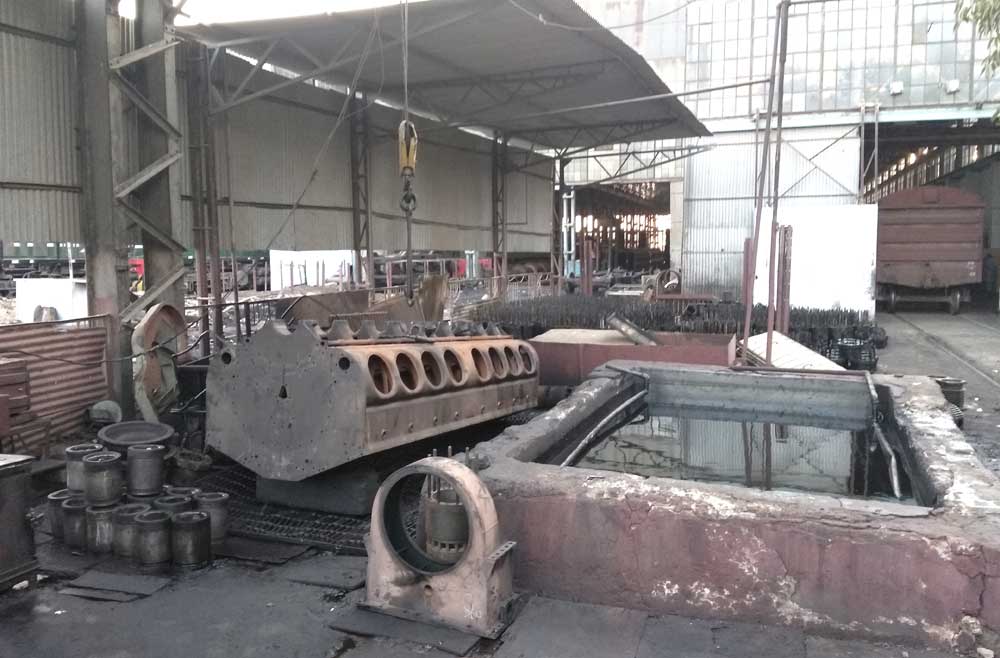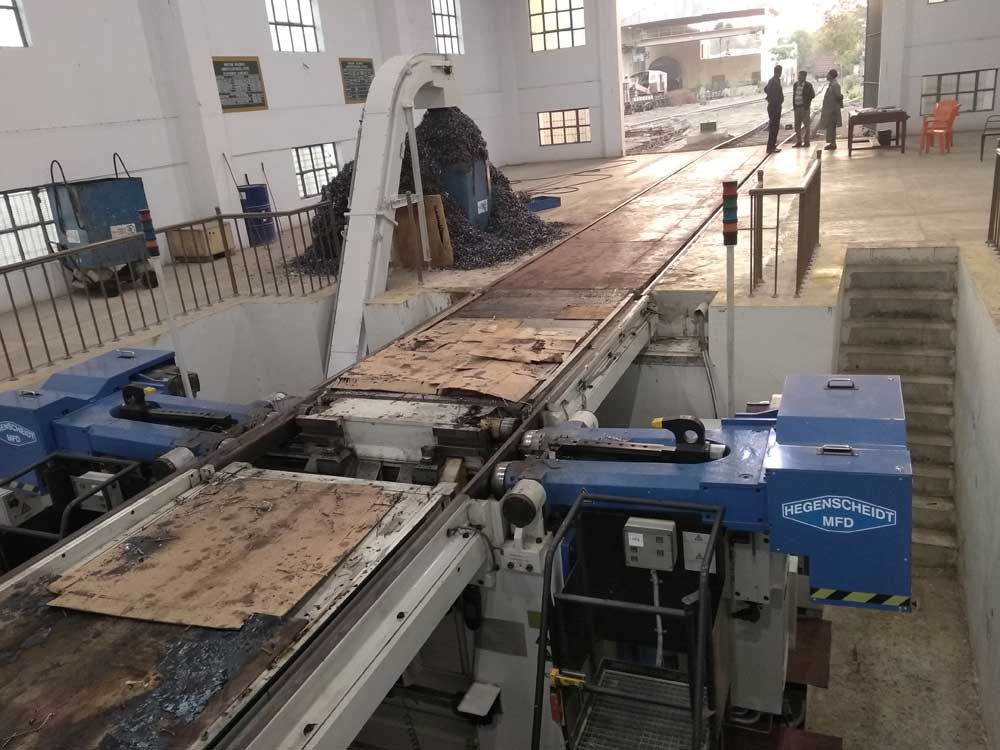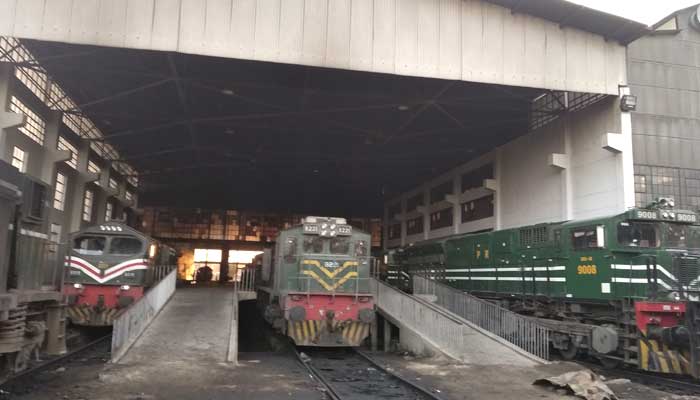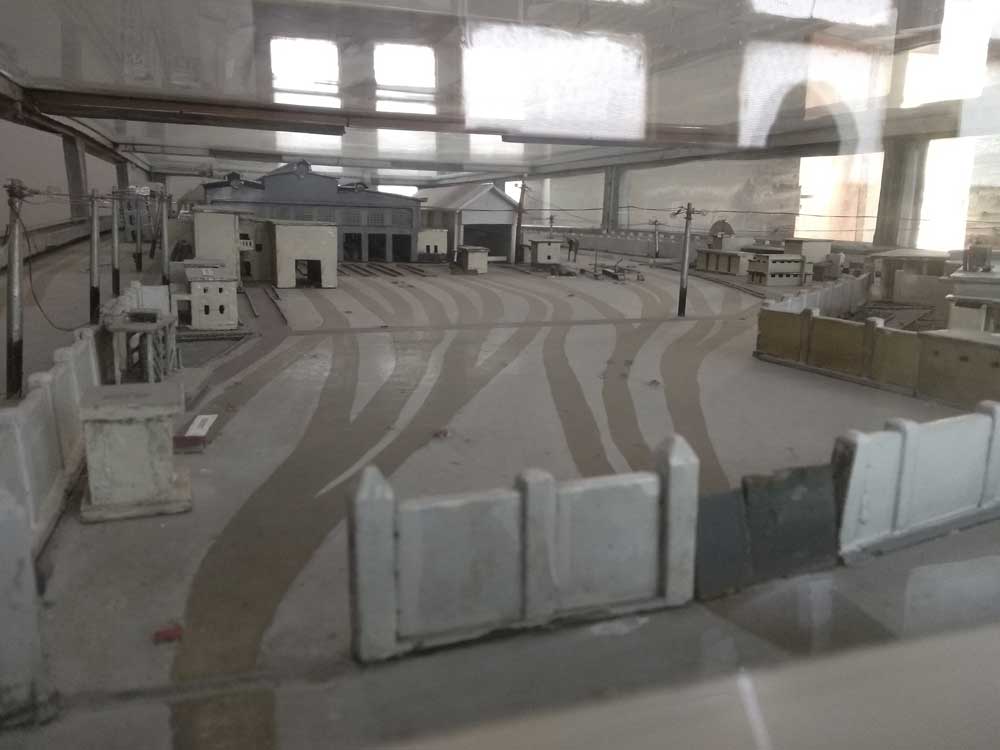A visit to the workshop that keeps Pakistan Railways’ locomotives chugging
Situated behind the Karachi Cantonment railway station, the workshop is a busy place where a large number of mechanics, engineers and helpers maintain the Pakistan Railways’ locomotives.
On the edge of a railway track stained all over with spilled lube oil, 53-year-old Muhammad Iqbal Rajput stands at the Diesel Workshop Karachi collecting basic information about a locomotive, which is later stationed inside a gigantic shed for further detailing.
Situated behind the Karachi Cantonment railway station, the workshop is a busy place where a large number of mechanics, engineers and helpers maintain the Pakistan Railways’ locomotives.
For the past 26 years Rajput has been working for the scheduling office of the Pakistan Railways’ mechanical department. He was initially appointed as a workman and later promoted to the rank of loco foreman.
He prepares daily reports, manages the histories of the trains’ journeys and keeps complete record of the locomotives’ performances. When one of them needs to be repaired or upgraded, he informs the relevant officers in the mechanical department to send the train to mechanics, craftsmen, technicians, blacksmiths or metalcutters.
These workmen at the workshop have been assigned to maintaining the trains whenever needed. Each of these employees has their own areas of expertise. However, after a locomotive enters the workshop, its lube oil is tested at the laboratory first of all to diagnose the technical faults in its engine.
And then electricians, mechanical engineers, workmen and the technical staff inspect other parts of the locomotive if it is stationed to be repaired at the workshop. They sometimes fabricate or replace the faulty parts. In exceptional cases, if a locomotive requires some major modifications, it is sent to the Central Diesel Locomotive Workshop in Rawalpindi.
“There is a scheduling system in the Pakistan Railways for repairing the locomotives and for their check-ups,” Rajput said. He added that the timetable consisted of categories labelled from A to F, but category B had been excluded from the list because it covered steam locomotives.
“After a journey of 800 kilometres, the technical staff checks a locomotive’s performance. Likewise, the workmen at the workshop inspect its weekly and monthly performances as per the defined schedules. If these engines need further treatment, the department decides where the trains should be sent for rehabilitation.”
A brief history
Rajput said Karachi’s Diesel Workshop was established in 1951. Soon after the partition, the Government of Pakistan spent Rs4.9 million on its construction. This maintenance base for repairing locomotives is the first and biggest of the Pakistan Railways’ mechanical department.
The Central Diesel LocomotiveWorkshop in Rawalpindi is another major workshop, while the Mughalpura Workshop in Lahore is renowned for rebuilding entire trains, including freight trains, carriages and new locomotives.
When the workshop came into existence, the North West Railways inducted the firstever fleet of diesel-engine locomotives (DELs) to the Pakistan Railways. It was a batch of 14 shunting units that were based in the workshop.
The same batch of DELs was used after independence on the open line. There were two units managed by the American Locomotive Company that were started in 1952- 53 after trials.
Steam locomotives gradually became obsolete after the start of DELs, which steadily increased over the decades. Until 2014 the Pakistan Railways had 545 DELs, with 142 of them based at the Karachi Cantonment railway station.
“I witnessed when steam locomotives used to be part of the fleet of the Pakistan Railways. Karachi division used to have eight steam locomotives,” said Rajput. In 2002 he had driven one of the steam locomotives that were kept on display at the Karachi Cantonment railway station.
There are seven railway divisions: Multan, Lahore, Rawalpindi, Peshawar, Quetta, Sukkur and Karachi. However, to meet the needs of the China-Pakistan Economic Corridor project, Gwadar will be declared one as well.
Inside the premises
The Diesel Workshop, also famously known as the Diesel Shed Karachi, is spread on a total area of 15.7 acres, housing a cooling area, an oil test laboratory, a chemical zone, three gigantic sheds, a welding area, manual and computerised wheel-lathing sheds, an administration block and a police post.
Most of the departments, including the laboratory, the welding area and the technical sections work round the clock. Blacksmiths, lathe mechanics and administrators work from 9am to 5pm.
In its heyday, the workshop employed more than 3,000 people. Although the workshop has fewer computerised machines, this historical place continues as a valued heritage site like a Rail Museum for the Pakistan Railways.
“We fabricate locomotive parts and complements,” said Rajput. “If the Pakistan Railways provides us with new technologies, we would develop the trains system in the country.”
Another worker, Rahim Khan, said that there is an acute shortage of modern technology to tackle rapid maintenance of locomotives. “Manual work is very timeconsuming because modification and fabrication in the locomotives need a bigger workforce. The situation right now is affecting our productivity.”
Important sections
The premises also houses a boiler shop. Once, it was a place where steam locomotives were built and repaired. It is the oldest part of the workshop. However, it has no more use.
“Back then, when steam engines used to be part of the North West Railway’s fleet in British India, it was the busiest place for rehabilitation,” said Noor Zeb, who works as a fitter at the workshop.
There is an area known as the Wheel Lathe Shed, where around 300 technical staff members work daily on trains’ wheels. During trains’ journeys, their wheels become out of shape. At first, workmen try to bring such wheels back in the round shape through manual machines.
Another worker, Muhammad Iqbal, said that last year, the then railways minister Khawaja Saad Rafique had inducted computerised machines that ease lathing into the shed, bringing perfection to their work.
The workshop houses three sheds, where welders inspect the exterior parts of locomotives. Following the procedures, if drivers observe faults during travelling, they share specific information with mechanics to eliminate the problem.
There is also an area specified for water tests, oil tests and chemical observations of locomotives. However, these sections of the workshop lack modern technologies. They look like traditional mechanical shops or old vehicle dumping stations.
Lack of technologies
Iqbal said: “A railway workshop needs a number of skilled workers for the DELs’ rehabilitations. Despite replacing a large number of employees with computerised machines and modern technologies, the Pakistan Railways still needs many manual workers.”
Working capacities
A locomotive driver, Muhammad Alam, said: “A locomotive is not a simple engine. It comprises the engine, the gas turbine, power transmissions and electric generators that create electric power to run the wheels on the tracks.”
He said that the assessment of a locomotive is very tricky and requires experts because it is not a simple vehicle engine. However, the technical staff members at the workshop are only capable of manufacturing some spare parts or altering some of the components required for the repairs.
While this workshop of the Pakistan Railways once used to be state-of-the-art, it now lacks modern technologies, with the use of which the workers can manufacture new trains.
-
 Travis Kelce Plays Key Role In Taylor Swift's 'Opalite' Remix
Travis Kelce Plays Key Role In Taylor Swift's 'Opalite' Remix -
 How Jennifer Aniston's 57th Birthday Went With Boyfriend Jim Curtis
How Jennifer Aniston's 57th Birthday Went With Boyfriend Jim Curtis -
 JoJo Siwa Shares Inspiring Words With Young Changemakers
JoJo Siwa Shares Inspiring Words With Young Changemakers -
 James Van Der Beek Loved Ones Breaks Silence After Fundraiser Hits $2.2M
James Van Der Beek Loved Ones Breaks Silence After Fundraiser Hits $2.2M -
 Disney’s $336m 'Snow White' Remake Ends With $170m Box Office Loss: Report
Disney’s $336m 'Snow White' Remake Ends With $170m Box Office Loss: Report -
 Travis Kelce's Mom Donna Kelce Breaks Silence On His Retirement Plans
Travis Kelce's Mom Donna Kelce Breaks Silence On His Retirement Plans -
 Premiere Date Of 'Spider-Noir' Featuring Nicolas Cage Announced
Premiere Date Of 'Spider-Noir' Featuring Nicolas Cage Announced -
 Pedro Pascal's Sister Reveals His Reaction To Her 'The Beauty' Role
Pedro Pascal's Sister Reveals His Reaction To Her 'The Beauty' Role -
 Kate Middleton Proves She's True 'children's Princess' With THIS Move
Kate Middleton Proves She's True 'children's Princess' With THIS Move -
 Paul Anka Reveals How He Raised Son Ethan Differently From His Daughters
Paul Anka Reveals How He Raised Son Ethan Differently From His Daughters -
 'A Very Special Visitor' Meets Queen Camilla At Clarence House
'A Very Special Visitor' Meets Queen Camilla At Clarence House -
 Jodie Turner Smith Shares One Strict Rule She Follows As A Mom
Jodie Turner Smith Shares One Strict Rule She Follows As A Mom -
 Hailey Bieber Reveals KEY To Balancing Motherhood With Career
Hailey Bieber Reveals KEY To Balancing Motherhood With Career -
 Photo Of Jay-Z, Other Prominent Figures With Jeffrey Epstein Proven To Be Fake
Photo Of Jay-Z, Other Prominent Figures With Jeffrey Epstein Proven To Be Fake -
 Hillary Clinton's Munich Train Video Sparks Conspiracy Theories
Hillary Clinton's Munich Train Video Sparks Conspiracy Theories -
 Fans Slam Talk Show Host For 'cringe' Behavior In Chris Hemsworth Interview
Fans Slam Talk Show Host For 'cringe' Behavior In Chris Hemsworth Interview







